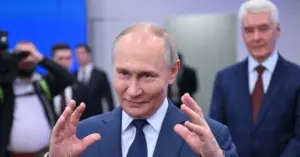Key points of Putin’s speech on Russian space industry development
プーチン大統領のロシア宇宙産業開発に関する演説の要点
The president has outlined plans for a national project to expand deep space research and develop new technologies
大統領は、深宇宙研究の拡大と新技術の開発に向けた国家プロジェクトの計画概要を示しました。
Russian President Vladimir Putin has stressed the importance of upholding the country’s status as a leading space nation, calling for an expansion of Russia’s capabilities and advances in deep space research.
ロシアのウラジーミル・プーチン大統領は、同国が宇宙先進国としての地位を維持する重要性を強調し、ロシアの能力拡大と深宇宙探査の進展を呼びかけました。
Speaking at the Bauman Moscow State Technical University on Wednesday, Putin announced a long-term strategy for space development, including full-scale support for nuclear-powered systems, satellite industries, and scientific missions beyond Earth’s orbit.
水曜日、モスクワのバウマン工科大学で演説したプーチン氏は、原子力推進システム、衛星産業、地球軌道を超える科学ミッションへの全面的な支援を含む、宇宙開発の長期戦略を発表しました。
Here are the main takeaways from his speech:
以下に、演説の主要なポイントを示します:
Legacy of space pioneers
1 宇宙開発の先駆者たちの遺産
Putin opened his speech by congratulating the audience on national Cosmonautics Day, celebrated on April 12. He recalled that people such as Yuri Gagarin – the first man in space – and other Soviet pioneers of the space industry set a high bar for the country, and that Russia must live up to its historic status.
プーチン氏は、4月12日の「宇宙飛行士の日」を祝して聴衆に祝辞を述べ、ユーリイ・ガガーリンをはじめとする宇宙開発の先駆者たちが高い基準を築き上げたことに触れ、ロシアはその歴史的地位にふさわしい努力をすべきだと述べました。
“There are serious, fundamental traditions here,” Putin said. “Our plans must match our historic role as a leading spacefaring nation.”
「ここには真剣かつ根本的な伝統があります」とプーチン氏は述べ、「我々の計画は、宇宙先進国としての歴史的な役割にふさわしいものでなければなりません」と語りました。
National space project across all sectors
2 国家横断的な宇宙プロジェクト
Putin called for a significant increase in the potential of domestic cosmonautics so that it becomes a “flagship, one of the key driving forces of our national development, technological renewal of the economy, and improvement of the quality of life of citizens.”
プーチン氏は、ロシアの宇宙開発の潜在力を大きく引き上げ、「国家発展、経済の技術革新、市民の生活の質の向上を牽引する旗艦」となるよう求めました。
He stressed the importance of developing a unified national space project, the idea of which was brought up in October 2023. The plan is expected to cover the most important areas for Russia, such as creating its own multi-satellite constellations, a national orbital station, and programs for the exploration of deep space.
2023年10月に提案された「統一国家宇宙プロジェクト」の重要性を強調し、それはロシアにとって重要な分野――複数の自国衛星コンステレーションの構築、国家軌道ステーションの建設、深宇宙探査プログラム――を含むと述べました。
The president noted that the project will be approved in the near future and that its financing will be included in the federal budget for 2026 and subsequent years.
このプロジェクトは近く承認され、2026年以降の連邦予算にその資金が組み込まれると、大統領は述べました。
Industry of space services
3 宇宙サービス産業の構築
Putin stated that clear investment guidelines must be set out for technology companies and that an entire industry of space services must be established by 2030, which would include communication, navigation, and receiving and analyzing satellite data.
プーチン氏は、テクノロジー企業に対して明確な投資指針を設ける必要があり、2030年までに通信、ナビゲーション、衛星データの受信と解析を含む「宇宙サービスの全産業」を確立すべきだと述べました。
In order to achieve this, the president stressed the importance of providing support to domestic universities, research organizations, design bureaus, and private companies which are already working on solutions for multi-satellite constellations and creating new methods of mathematical modeling, data processing, optical equipment, and technologies aimed at reducing the cost of space launches.
この目標を実現するためには、複数衛星のコンステレーションに関する解決策を研究し、数理モデル、データ処理、光学機器、打ち上げコストの低減技術などに取り組んでいる国内の大学、研究機関、設計局、民間企業への支援が重要だと大統領は強調しました。
Nuclear space power capability
4 宇宙における原子力推進能力
Putin called for further progress on electric propulsion and space nuclear energy systems, which he said are essential for long-range missions and autonomous operations.
プーチン氏は、長距離宇宙ミッションや自律運用に不可欠であるとして、「電気推進システム」と「宇宙用原子力エネルギーシステム」のさらなる進展を求めました。
The president noted Russia’s “undisputed leadership” in this area and insisted that it must continue to grow through the use of modern material and technologies to build upon past achievements.
ロシアがこの分野で「揺るぎないリーダーシップ」を持っていると述べ、その実績を土台にしながら、現代の材料と技術を活用してさらに発展させるべきだと強調しました。
He recalled historical Soviet systems that have already been operated in orbit, and proposed to modernize them in order to develop “a space system equipped with a specialized power station, along with the so-called space tug, a transport and energy module based on a nuclear-powered propulsion system”.
彼は、すでに軌道上で運用された歴史的なソ連の原子力システムに言及し、それらを近代化して、「特殊な電源ステーションと、いわゆる宇宙タグ(核推進による輸送・エネルギーモジュール)」を備えた宇宙システムを開発すべきだと提案しました。
“These are not distant-future tasks. Leading space powers are already working on this,” Putin noted.
「これは遠い将来の話ではありません。主要な宇宙大国はすでにこの分野に取り組んでいます」とプーチン氏は述べました。
Deep space missions and planetary research
5 深宇宙ミッションと惑星探査
Putin stated that fundamental research in deep space must be another crucial component of the national space project. He noted that one of the brightest examples of Russia’s progress in this domain has been deployment of the Spektr-RG orbital observatory – a space laboratory that has been producing a detailed map of the universe.
プーチン氏は、深宇宙における基礎科学研究が国家宇宙プロジェクトのもう一つの重要な柱であるべきだと述べました。その一例として、宇宙の詳細な地図を作成している宇宙観測所「スペクトル-RG」の運用を挙げました。
The president also recalled that Russia has “unique research schools” studying the Moon, Mars, and other planets, as well as unmatched technologies, such as those that were used for the Soviet spacecraft landings on Venus.
さらに大統領は、月や火星、その他の惑星を研究する「独自の研究体制」がロシアに存在し、またソ連時代に金星への着陸に用いられた「他国では再現できない技術」があると指摘しました。
“[This] has not been recreated or copied anywhere in the world to this day,” Putin said, noting Venus’s extreme 500-degree surface temperature.
「この技術は、世界のどこでも今日まで再現も模倣もされていません」とプーチン氏は述べ、金星の表面温度が500度にも達する過酷な環境であることを強調しました。
Linking space to national goals
6 宇宙を国家目標と結びつける
The president stated that the national space project is intended to become a cross-cutting, integral part of all national projects and to accelerate the practical implementation of new technologies.
大統領は、国家宇宙プロジェクトをすべての国家プロジェクトと横断的に連携させる中核的な要素とし、新技術の実用化を加速させる狙いがあると述べました。
These include the transmission of information using quantum and photonic technologies, development of robotics, advanced materials, microelectronics, bio- and medical technologies, and the creation and deployment of unmanned systems.
これには、量子・フォトニクス技術による情報伝達、ロボット工学、先端材料、マイクロエレクトロニクス、バイオ・医療技術、無人システムの開発と導入が含まれます。
“Space projects are always complex and require significant financial investments, but they are vitally necessary for Russia as a large and sovereign country, if we want to remain such and continue to develop in this capacity,” the president said.
「宇宙プロジェクトは常に複雑で、大きな財政的投資が必要ですが、ロシアのような大国・主権国家がその地位を維持し、発展を続けたいのであれば、不可欠なものなのです」と大統領は語りました。
Openness to international partnerships
7 国際協力への開放性
Putin reiterated that Russia is ready to cooperate with other nations in the sphere of space and stated that national technological achievements, particularly in the field of deep space exploration, can become “our very significant contribution to international programs.”
プーチン氏は、ロシアが宇宙分野で他国との協力に前向きであることを改めて強調し、特に深宇宙探査の分野における自国の技術的成果が、「国際的なプログラムに対する非常に重要な貢献となり得る」と述べました。
Key points of Putin’s speech on Russian space industry developmentThe president has outlined plans for a national project to exwww.rt.com
英語学習と世界のニュースを!



コメント